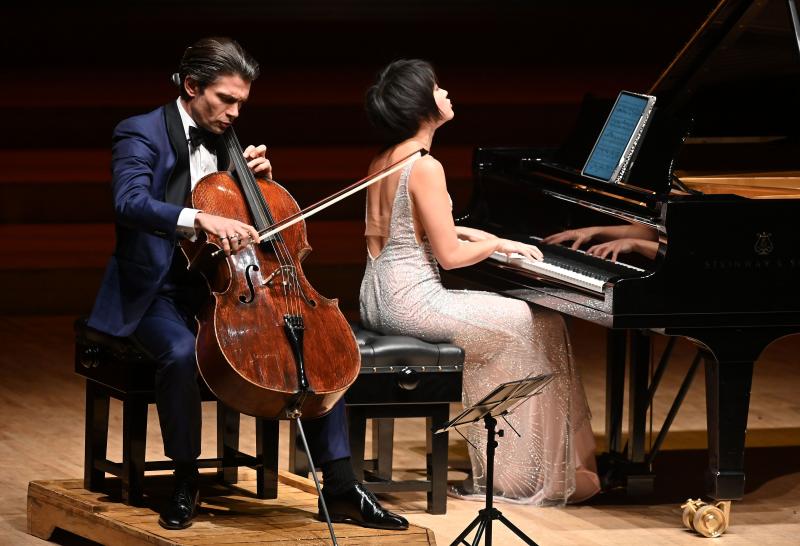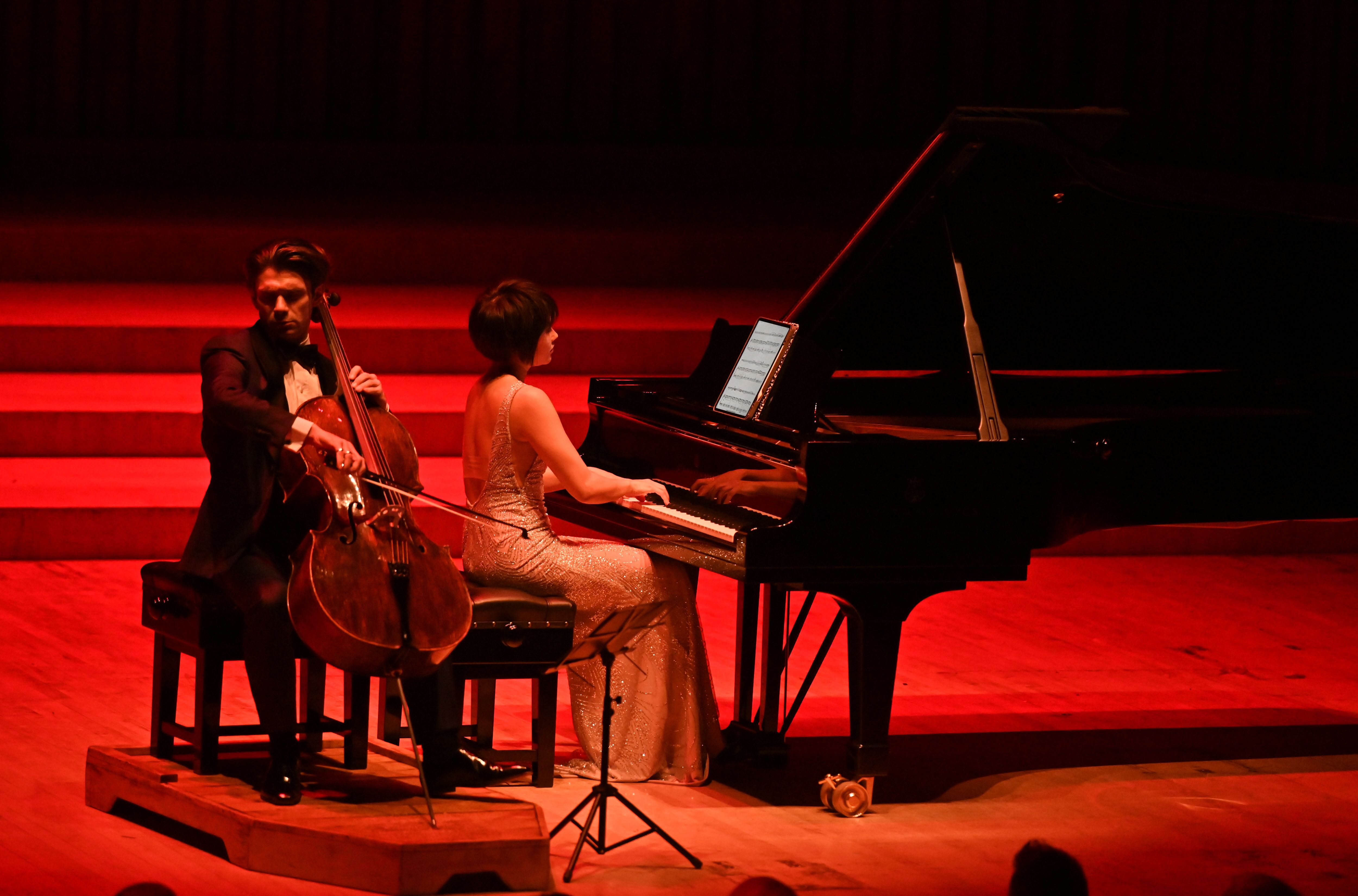Gautier Capuçon, Yuja Wang, Barbican review - spellbinding moments in circumscribed programme | reviews, news & interviews
Gautier Capuçon, Yuja Wang, Barbican review - spellbinding moments in circumscribed programme
Gautier Capuçon, Yuja Wang, Barbican review - spellbinding moments in circumscribed programme
It takes Piazzolla to ignite an audience after sophisticated Franck and Chopin

Why go to hear a cello-and-piano recital in a large hall, and a rather unsatisfying programme (delayed without explanation for 15 minutes, incidentally) spotlighting a transcription of a work which was created for the violin?
Capuçon the cellist didn't solve all problems in Jules Delsart's arrangement of Franck's A major Violin Sonata - a work ideally played by his brother Renaud. First, yes, a great singer among instrumentalists can capture most of the essence, just as sopranos and mezzos can reign supreme in Schubert and Mahler song cycles composed for tenors and baritones. But the restless, leaping and plunging theme which turns up in the slow movement and finale needs to hit the stratosphere. Fine-tuned to Wang's every subtlety, and she to his, Capuçon didn't seem best served by her fast tempi for scherzo and finale; these both needed just a bit more space to capture the singularity of their respective angst and heartease.  The not-quite 20-year-old Chopin's Introduction and Polonaise brillante puts pianistic transcendentalism very much in the spotlight, and Wang dazzled here; Capucon sang again, but the themes aren't so interesting (and the work's not a patch on the Andante spianato and Grande Polonaise brillante for piano solo). Maybe this should have been the encore, and not the big, unadvertised Le Grand Tango by Astor Piazzolla. Its dancing energy set the audience (and the lighting, pictured above) on fire; the central reverie had the same magical inwardness that made the Largo of Chopin's Cello Sonata another highlight: no overt sentimentality, only consummate proof that this is one of the most original elegies of the 19th century.
The not-quite 20-year-old Chopin's Introduction and Polonaise brillante puts pianistic transcendentalism very much in the spotlight, and Wang dazzled here; Capucon sang again, but the themes aren't so interesting (and the work's not a patch on the Andante spianato and Grande Polonaise brillante for piano solo). Maybe this should have been the encore, and not the big, unadvertised Le Grand Tango by Astor Piazzolla. Its dancing energy set the audience (and the lighting, pictured above) on fire; the central reverie had the same magical inwardness that made the Largo of Chopin's Cello Sonata another highlight: no overt sentimentality, only consummate proof that this is one of the most original elegies of the 19th century.
There's a comparably memorable idea in the Scherzo. But for all Wang's suspension of time in the opening Allegro moderato, and a totally together tumultuousness in the finale, this late work isn't as strikingly modern and adventurous as many of Chopin's contemporary pieces for solo piano. Nor are the outer movements among the greatest cello sonata inspirations. Another, more probing specimen from the 20th century - Martinů, Hindemith, Prokofiev, Shostakovich spring immediately to mind - would have rounded out a recital which still felt rather short measure. These are great artists, undoubtedly; one just wanted more. Which undoubtedly we'll get when Wang, "spotlit" Barbican artist, returns for a solo piano recital on 31 March.
Add comment
The future of Arts Journalism
You can stop theartsdesk.com closing!
We urgently need financing to survive. Our fundraising drive has thus far raised £49,000 but we need to reach £100,000 or we will be forced to close. Please contribute here: https://gofund.me/c3f6033d
And if you can forward this information to anyone who might assist, we’d be grateful.

Subscribe to theartsdesk.com
Thank you for continuing to read our work on theartsdesk.com. For unlimited access to every article in its entirety, including our archive of more than 15,000 pieces, we're asking for £5 per month or £40 per year. We feel it's a very good deal, and hope you do too.
To take a subscription now simply click here.
And if you're looking for that extra gift for a friend or family member, why not treat them to a theartsdesk.com gift subscription?
more Classical music
 Monteverdi Choir, ORR, Heras-Casado, St Martin-in-the-Fields review - flames of joy and sorrow
First-rate soloists, choir and orchestra unite in a blazing Mozart Requiem
Monteverdi Choir, ORR, Heras-Casado, St Martin-in-the-Fields review - flames of joy and sorrow
First-rate soloists, choir and orchestra unite in a blazing Mozart Requiem
 Cho, LSO, Pappano, Barbican review - finely-focused stormy weather
Chameleonic Seong-Jin Cho is a match for the fine-tuning of the LSO’s Chief Conductor
Cho, LSO, Pappano, Barbican review - finely-focused stormy weather
Chameleonic Seong-Jin Cho is a match for the fine-tuning of the LSO’s Chief Conductor
 Classical CDs: Shrouds, silhouettes and superstition
Cello concertos, choral collections and a stunning tribute to a contemporary giant
Classical CDs: Shrouds, silhouettes and superstition
Cello concertos, choral collections and a stunning tribute to a contemporary giant
 Appl, Levickis, Wigmore Hall review - fun to the fore in cabaret and show songs
A relaxed evening of light-hearted fare, with the accordion offering unusual colours
Appl, Levickis, Wigmore Hall review - fun to the fore in cabaret and show songs
A relaxed evening of light-hearted fare, with the accordion offering unusual colours
 Lammermuir Festival 2025, Part 2 review - from the soaringly sublime to the zoologically ridiculous
Bigger than ever, and the quality remains astonishingly high
Lammermuir Festival 2025, Part 2 review - from the soaringly sublime to the zoologically ridiculous
Bigger than ever, and the quality remains astonishingly high
 BBC Proms: Ehnes, Sinfonia of London, Wilson review - aspects of love
Sensuous Ravel, and bittersweet Bernstein, on an amorous evening
BBC Proms: Ehnes, Sinfonia of London, Wilson review - aspects of love
Sensuous Ravel, and bittersweet Bernstein, on an amorous evening
 Presteigne Festival 2025 review - new music is centre stage in the Welsh Marches
Music by 30 living composers, with Eleanor Alberga topping the bill
Presteigne Festival 2025 review - new music is centre stage in the Welsh Marches
Music by 30 living composers, with Eleanor Alberga topping the bill
 Lammermuir Festival 2025 review - music with soul from the heart of East Lothian
Baroque splendour, and chamber-ensemble drama, amid history-haunted lands
Lammermuir Festival 2025 review - music with soul from the heart of East Lothian
Baroque splendour, and chamber-ensemble drama, amid history-haunted lands
 BBC Proms: Steinbacher, RPO, Petrenko / Sternath, BBCSO, Oramo review - double-bill mixed bag
Young pianist shines in Grieg but Bliss’s portentous cantata disappoints
BBC Proms: Steinbacher, RPO, Petrenko / Sternath, BBCSO, Oramo review - double-bill mixed bag
Young pianist shines in Grieg but Bliss’s portentous cantata disappoints
 theartsdesk at the Lahti Sibelius Festival - early epics by the Finnish master in context
Finnish heroes meet their Austro-German counterparts in breathtaking interpretations
theartsdesk at the Lahti Sibelius Festival - early epics by the Finnish master in context
Finnish heroes meet their Austro-German counterparts in breathtaking interpretations
 Classical CDs: Sleigh rides, pancakes and cigars
Two big boxes, plus new music for brass and a pair of clarinet concertos
Classical CDs: Sleigh rides, pancakes and cigars
Two big boxes, plus new music for brass and a pair of clarinet concertos
 Waley-Cohen, Manchester Camerata, Pether, Whitworth Art Gallery, Manchester review - premiere of no ordinary violin concerto
Images of maternal care inspired by Hepworth and played in a gallery setting
Waley-Cohen, Manchester Camerata, Pether, Whitworth Art Gallery, Manchester review - premiere of no ordinary violin concerto
Images of maternal care inspired by Hepworth and played in a gallery setting

Comments
Agree with the comment about